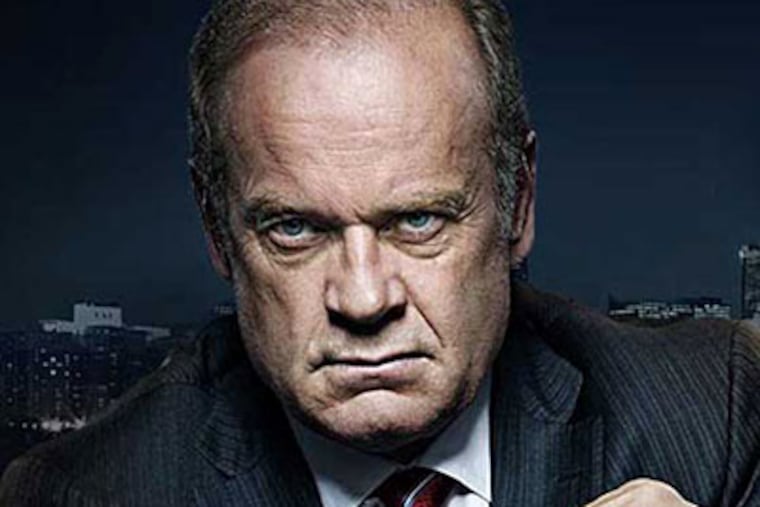
Is Chicago Mayor Tom Kane, the titular character in Starz's addictive new political drama, Boss, a good man?
Is he a bad man? An evil man?
Created and written by Farhad Safinia, Boss is a compeling, intimate, behind-the-scenes look at a larger-than-life big-city mayor and how he, his aides, his cronies, and his political enemies run their town. Happily, the show stays out of partisan politics - it never mentions party names or affiliations.
Boss' first of eight episodes premiered Friday (and is available through Video on Demand), and the show returns Friday for its second episode. If, like many viewers, you're starved for complex characters and a fascinating storyline, don't let anything stop you from watching it.
The show succeeds in large part because of its fine writing and its powerful star: Kane is played with explosive intensity by a particularly jowly, bulldog-ish Kelsey Grammer in what might be his best role to date.
He's surrounded by a great supporting cast, including Martin Donovan and Kathleen Robertson as his two top aides, and Connie Nielsen as his wife, Meredith.
Like HBO's masterpiece The Wire, Boss takes complicated, conflicted, three-dimensional characters and weaves them into a multilayered web of relationships, all in the context of a teeming metropolis.
(Warning: The following contains Episode 1 spoilers.)
Boss' Gus Van Sant-helmed debut episode opens with bad news: Kane's neurologist, Ella Harris (Karen Aldridge), tells him that he has a degenerative neurological disease that will gradually reduce his higher mental functions and control over his bodily functions to mush. Kane has less than five years to live.
He isn't about to step down as mayor, which sets up one of the show's main conflicts: How long can he keep his illness a secret?
Practical issues aside, the news compels Kane to reflect on his own mortality and begin to take stock of his life.
It's a terrific way to begin the story: From the get-go, the audience is similarly prompted to take stock of Kane's character, to evaluate his actions.
Which brings us to our question: Is Kane a good or a bad man?
Boss doesn't provide any easy answers. It muddies matters by posing another question: Do the usual moral categories apply to leaders?
Presidents order wars, assassinations. They make terrifying decisions that sometimes have terrible consequences. How do we judge their actions?
Sure, Kane's no president, but as the boss of America's third-largest city, his decisions shape and mold (and sometimes twist and destroy) the lives of almost 2.7 million men and women. He's responsible for their well-being. And sometimes, he must do terrible things in their name. Or so he believes.
By the end of the first episode we learn that Kane's life is less than ideal.
He and his wife act like a storybook couple in public but live separate lives in separate sides of their house. They put up a united front, as Meredith puts it, to maintain their social position and their power.
Worse, we learn that years earlier they cut off all communication with their only child, Emma (Hannah Ware), because her battles with drug addiction made her a liability to the Kanes' political aspirations.
They're not exactly ideal parents.
(Now an Episcopal priest, Emma wants nothing to do with the Kanes.)
That's not the extent of Tom Kane's ethical crimes and misdemeanors.
He pretends to support the incumbent governor, Mac Cullen (Francis Guinan), even joining him on campaign appearances. At the same time, he maneuvers Cullen's young, idealistic subordinate, state treasurer Ben Zajac (Jeff Hephner), to destroy Cullen in the primaries.
In the episode's most breathtaking scene, Kane has his aide Kitty, played by Robertson, enumerate every single shady deal, payoff, lawsuit, city council meeting, media attack, and backroom deal the mayor has put together over the course of his term to launch a multimillion-dollar expansion of O'Hare airport.
It's a dizzying array of distasteful, unethical, and perhaps even illegal actions. At the same time, it'll create hundreds of jobs.
Things get really creepy when Kane asks an aide to send his doctor "a gentle reminder" to keep the mayor's condition a secret.
One of Kane's enforcers corners the good doctor as she arrives to pick up her son from baseball practice. He injects her with a drug that temporarily paralyzes her (can't have her screaming or running!), then recites the Hippocratic oath in her ear.
So is citizen Kane a bad man?
Is being an effective leader incompatible with being virtuous, morally upright?
Leaders can lead only by enforcing their authority and amassing power. Will that invariably make them part devil?
People can watch first episode for FREE online